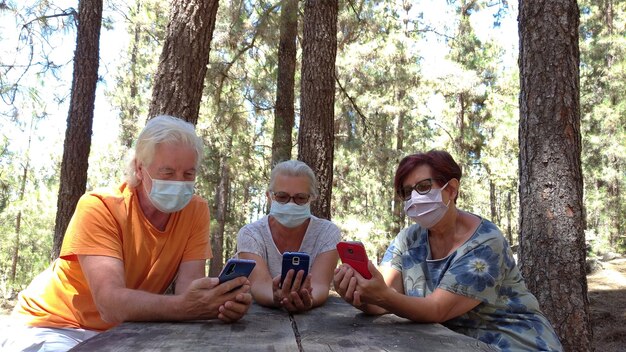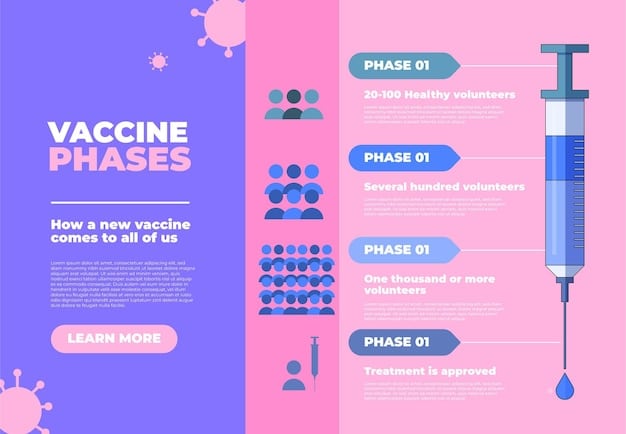CDC Immunization Updates for Seniors in 2025

The Centers for Disease Control and Prevention (CDC) continuously refines vaccination guidelines for older adults to enhance public health, with 2025 recommendations focusing on reinforcing protection against respiratory pathogens like COVID-19, influenza, RSV, and ensuring coverage for common adult vaccines, including pneumonia and shingles.
Understanding the latest health recommendations is paramount for maintaining well-being, especially for older adults. As we approach 2025, many are asking: What are the Updated CDC Recommendations for Senior Vaccinations in 2025? These guidelines are crucial for protecting seniors from preventable diseases, offering a proactive approach to health.
The Evolving Landscape of Senior Immunization
The field of vaccinology is dynamic, constantly adapting to new scientific discoveries, pathogen mutations, and emerging health threats. For seniors, defined broadly as individuals aged 65 and older, these evolving guidelines are particularly vital due to their increased vulnerability to severe outcomes from many infectious diseases. Understanding the context of these updates means recognizing that the CDC’s recommendations are not static; rather, they are the result of rigorous scientific review, clinical trial data, and epidemiological surveillance. This continuous assessment ensures that the advice provided is both timely and maximally effective for the target population.
Recent years have underscored the critical role of vaccination in public health, particularly for those in higher-risk categories. The experience with respiratory viruses has highlighted the importance of robust immunization strategies. Looking ahead to 2025, the CDC builds upon lessons learned, aiming to provide a comprehensive shield against prevalent and potentially severe infections. This involves not only updating existing vaccine schedules but also integrating new vaccine formulations or novel vaccines as they gain approval and are deemed beneficial for the senior demographic. The goal remains consistent: to reduce morbidity, mortality, and the overall burden of vaccine-preventable diseases on individuals and the healthcare system.
Key Principles Guiding CDC Recommendations
The CDC’s advisory committee, the Advisory Committee on Immunization Practices (ACIP), operates under several core principles when formulating its recommendations. These principles ensure that guidelines are evidence-based, equitable, and ultimately serve the public good. They consider factors like disease burden, vaccine efficacy and safety, cost-effectiveness, and feasibility of implementation.
- Disease Burden: Assessing how impactful a disease is on the senior population in terms of illness, hospitalization, and death.
- Vaccine Efficacy and Safety: Evaluating how well a vaccine prevents disease and its potential side effects in clinical trials and real-world data.
- Risk-Benefit Analysis: Weighing the protective benefits against any potential risks or adverse reactions for the target demographic.
- Age-Specific Considerations: Acknowledging that immune responses and disease susceptibility can differ significantly with age, necessitating tailored recommendations.
These principles ensure that the recommendations are not arbitrarily determined but are instead carefully considered policies designed to optimize health outcomes for older adults. The continuous review process means that even if a vaccine has been recommended for years, its place in the schedule is regularly re-evaluated in light of new data or changing epidemiological patterns.
Influenza and COVID-19: Continued Vigilance
For 2025, influenza and COVID-19 vaccinations remain central pillars of senior immunization strategies. These respiratory viruses pose significant risks to older adults, often leading to more severe illness, complications, and hospitalizations compared to younger populations. The CDC’s recommendations for these vaccines are expected to reflect ongoing scientific advancements regarding viral evolution, vaccine effectiveness against new variants, and optimal timing for administration.
The influenza vaccine is an annual necessity, as influenza viruses continually mutate. For seniors, high-dose or adjuvanted flu vaccines are often recommended due to their enhanced immune response compared to standard-dose vaccines. These specialized formulations are designed to stimulate a stronger protective response in the aging immune system, which naturally tends to be less robust. The 2025 guidelines will likely reinforce the importance of annual flu shots, ideally administered before influenza activity becomes widespread in the community. Compliance with annual vaccination is crucial, as protection from the previous year’s vaccine typically wanes and the circulating strains often change.
For COVID-19, the landscape is still evolving. With new variants emerging and vaccine technologies advancing, the 2025 recommendations will aim to provide updated guidance on booster schedules and potentially new vaccine formulations. The CDC is expected to continue emphasizing the importance of staying up-to-date with COVID-19 vaccinations, especially for seniors who face a higher risk of severe disease. This may involve recommendations for specific mRNA or protein-based vaccines, tailored to the circulating variants, and potentially suggesting combination vaccines that offer protection against multiple respiratory illnesses simultaneously. The fluid nature of the virus means that these recommendations could be subject to further adjustments as more data becomes available throughout 2025.
RSV Vaccination: A Newer Imperative
The introduction of vaccines against Respiratory Syncytial Virus (RSV) represents a significant advance in adult immunization, particularly for seniors. While RSV has long been recognized as a concern for infants, its severe impact on older adults, especially those with underlying health conditions, has gained increasing attention. For 2025, RSV vaccination is set to become an even more firmly established recommendation, marking a crucial addition to the senior immunization schedule.
RSV can cause severe lower respiratory tract infections, leading to bronchitis, pneumonia, and exacerbation of chronic conditions like COPD and heart failure. For seniors, the disease burden is comparable to or even greater than that of influenza in some seasons. The availability of safe and effective RSV vaccines specifically for older adults provides a vital tool for prevention. These vaccines are designed to elicit strong protective immune responses, significantly reducing the risk of severe RSV disease, hospitalization, and death among vaccinated individuals.
The 2025 CDC guidelines will likely continue to recommend a single dose of an approved RSV vaccine for adults aged 60 years and older, particularly those at higher risk due to chronic medical conditions or living in long-term care facilities. The specific timing of administration may also be emphasized, often before the anticipated RSV season, typically in the fall. The integration of RSV vaccination into routine senior care is a testament to its proven benefits and the recognition of RSV as a serious threat to this demographic. This vaccine not only protects the individual but also contributes to reducing the overall viral transmission within communities, thereby safeguarding other vulnerable populations.

Pneumococcal and Shingles Vaccines: Consistent Protection
Pneumococcal disease and shingles (herpes zoster) remain significant health concerns for seniors, and their respective vaccinations continue to be foundational elements of the CDC’s immunization recommendations for 2025. These vaccines offer consistent, long-term protection against two common and potentially debilitating conditions that disproportionately affect older adults.
Pneumococcal disease, caused by the bacterium Streptococcus pneumoniae, can lead to severe infections such as pneumonia, meningitis, and bloodstream infections. Seniors are particularly susceptible to severe outcomes from these infections. The CDC’s recommendations for pneumococcal vaccination typically involve a combination of different vaccine types, such as PCV15 or PCV20 (pneumococcal conjugate vaccines) and PPSV23 (pneumococcal polysaccharide vaccine), often administered in a specific sequence to maximize protection. The 2025 guidelines will likely reaffirm the importance of these vaccines, possibly refining the nuanced guidance on vaccine selection and administration schedules based on the individual’s prior vaccination history and specific health status. The goal is to provide broad protection against the most prevalent and dangerous serotypes of pneumococcal bacteria.
Similarly, shingles, caused by the reactivation of the varicella-zoster virus (the same virus that causes chickenpox), is a painful and often debilitating condition that becomes more common and severe with age. The highly effective recombinant zoster vaccine (RZV) is strongly recommended for adults aged 50 and older. This vaccine significantly reduces the risk of developing shingles and, importantly, greatly lowers the incidence of post-herpetic neuralgia (PHN), a long-lasting and severe nerve pain complication. The 2025 CDC recommendations are expected to continue advocating for the two-dose RZV series for all eligible seniors, emphasizing its robust efficacy and safety profile in preventing this painful disease. These established vaccines underscore a critical aspect of senior health: leveraging proven prevention strategies to maintain quality of life and minimize disease burden.
Tetanus, Diphtheria, Pertussis (Tdap) and Other Essential Vaccines
Beyond the major respiratory and age-related specific vaccines, the CDC’s comprehensive immunization recommendations for seniors in 2025 also include essential routine vaccinations such as Tetanus, Diphtheria, and Pertussis (Tdap), and consideration of other vaccines based on individual risk factors, travel, or occupational exposures. These vaccinations ensure a broad spectrum of protection against a range of infectious diseases.
The Tetanus, Diphtheria, and Pertussis (Tdap) vaccine is vital for adults, including seniors, due to the potential severity of these diseases. Tetanus can cause severe muscle spasms and lockjaw, while diphtheria can lead to breathing difficulties, heart failure, and nerve damage. Pertussis, or whooping cough, though often considered a childhood disease, can cause prolonged coughing fits in adults and is particularly dangerous for infants who may contract it from unvaccinated adults. The CDC generally recommends a Tdap vaccine for all adults who have not previously received it, followed by a Td (tetanus and diphtheria) booster every 10 years. For seniors who frequently interact with infants or young children, receiving the Tdap vaccine every 10 years might be specifically emphasized to protect vulnerable populations from pertussis transmission.
Other essential vaccinations that may be recommended for seniors beyond the standard schedule often depend on individual circumstances. These might include Hepatitis B vaccine for those at risk of exposure, Hepatitis A vaccine for travelers to high-risk areas, and Meningococcal vaccines for individuals with certain medical conditions or those traveling to specific regions. Discussion with a healthcare provider is paramount to assess personal risk factors and determine the appropriateness of these additional vaccines. The CDC provides detailed guidance for these situational recommendations, ensuring that seniors receive tailored protection based on their unique health profile and lifestyle. This holistic approach ensures seniors are protected not just from the most common threats but also from those that may pose a specific risk to them.
Navigating the Recommendations: What Seniors and Caregivers Need to Do
Understanding and acting upon the updated CDC recommendations for senior vaccinations in 2025 requires proactive engagement from seniors themselves, their families, and their caregivers. While the guidelines provide a clear framework, successful implementation depends on individual circumstances, access to healthcare, and informed decision-making. Navigating these recommendations effectively involves several key steps, ensuring that older adults receive the most appropriate and timely immunizations.
The first and most critical step is to maintain open and regular communication with a healthcare provider. This includes primary care physicians, geriatric specialists, or pharmacists who are knowledgeable about vaccine schedules. These professionals can review an individual’s medical history, current health status, prior vaccination records, and any potential contraindications or precautions. They can then provide personalized recommendations based on the CDC’s general guidelines, tailoring the advice to the senior’s specific needs. It’s important for seniors and their caregivers to ask questions, voice any concerns, and ensure they fully understand the “why” behind each recommended vaccine.
Furthermore, being aware of community resources and opportunities for vaccination is highly beneficial. Many pharmacies, community health centers, and local health departments offer vaccination services, often without requiring an appointment. Keeping an eye on public health campaigns and local clinic schedules can ensure convenient access to necessary immunizations. For caregivers, advocating for their loved ones, helping to schedule appointments, and providing transportation can significantly improve vaccination rates among seniors. The collective effort of individuals, families, and healthcare systems is essential to fully realize the protective benefits of the 2025 CDC vaccination recommendations for older adults.
Practical Steps for Seniors and Caregivers
Taking practical steps can simplify the process of staying up-to-date with vaccination recommendations. A little preparation can go a long way in ensuring comprehensive protection.
- Review records: Keep an updated record of all past vaccinations. This helps healthcare providers determine what vaccines are still needed.
- Schedule annual check-ups: Use annual physicals as an opportunity to discuss vaccination needs with a doctor.
- Stay informed: Follow reliable health news sources and official CDC updates, but always confirm with a healthcare professional.
- Utilize pharmacy services: Many pharmacies offer convenient vaccination services; check with local pharmacies for availability.
- Discuss concerns: Do not hesitate to discuss any fears or questions about vaccines with a healthcare provider.
By taking these proactive measures, seniors and their caregivers can effectively navigate the updated recommendations, ensuring that older adults are adequately protected against vaccine-preventable diseases. This proactive approach not only safeguarding individual health but also contributes to community-wide well-being. Keeping up with vaccinations is not just about avoiding illness; it’s about preserving quality of life and independence. Informed decisions, facilitated by healthcare professionals and reliable information, are key to maximizing the benefits of the 2025 immunization guidelines for seniors.

The Broader Impact of Senior Immunization on Public Health
The updated CDC recommendations for senior vaccinations in 2025 extend beyond individual protection; they have a profound and far-reaching impact on public health as a whole. Immunizing the senior population contributes significantly to community immunity (herd immunity), reduces strain on healthcare systems, and helps to foster a healthier, more resilient society. Recognizing these broader benefits underscores the importance of widespread adherence to vaccination guidelines.
When a large proportion of seniors are immunized against common infectious diseases, it creates a formidable barrier against disease transmission. This “herd immunity” indirectly protects individuals who cannot be vaccinated due to medical reasons, or those whose immune systems do not respond as strongly to vaccines. For example, by vaccinating seniors against diseases like influenza and pertussis, the risk of them transmitting these infections to vulnerable infants or immunocompromised individuals is significantly reduced. This ripple effect of protection is a cornerstone of public health strategy, highlighting that vaccination is not merely a personal choice but a collective responsibility. It is a powerful demonstration of how individual health decisions influence the larger community’s well-being.
Furthermore, high vaccination rates among older adults alleviate pressure on healthcare infrastructure. A reduction in vaccine-preventable illnesses translates to fewer doctor visits, emergency room visits, hospitalizations, and intensive care admissions. This not only frees up valuable resources for other medical needs but also reduces healthcare costs, both for individuals and for the system at large. For 2025, robust immunization programs for seniors will be crucial in maintaining healthcare system capacity, especially in the face of ongoing challenges from new pathogens or endemic diseases. The investment in preventative care, through vaccination, yields substantial returns in public health resilience and economic stability.
Community Resilience Through Collective Protection
The concept of community resilience is deeply intertwined with high vaccination coverage. A community where a significant portion of its vulnerable members, such as seniors, are protected against infectious diseases is better equipped to withstand outbreaks and maintain essential services.
- Reduced Outbreak Severity: Mass vaccination helps to contain outbreaks quickly, reducing the number of cases and limiting the spread.
- Healthcare System Stability: Fewer severe cases mean hospitals and clinics can focus on other critical health needs rather than being overwhelmed by preventable illnesses.
- Sustained Economic Activity: A healthier population, particularly a healthy workforce and older adults who contribute actively to society, supports continued economic productivity.
- Improved Quality of Life: By preventing illness and complications, vaccination allows seniors to maintain their independence and participate fully in family and community life.
The 2025 CDC recommendations for senior vaccinations are therefore more than just medical advice; they are a vital component of a comprehensive public health strategy aimed at building stronger, healthier communities. By embracing these guidelines, seniors, their families, and healthcare providers contribute to a collective shield that protects everyone. The continued emphasis on science-backed, accessible immunization ensures that the benefits of modern medicine are fully leveraged for the well-being of the entire population.
Addressing Misinformation and Promoting Vaccine Confidence
In an era saturated with information, addressing misinformation and fostering vaccine confidence are paramount, especially concerning updated health recommendations for seniors. The 2025 CDC guidelines for senior vaccinations will not only detail necessary immunizations but also implicitly call for clear communication and robust factual dissemination to combat pervasive myths and unfounded fears. For these recommendations to be truly effective, trust in scientific institutions and public health advice must be maintained and strengthened.
Misinformation, often spread rapidly through digital channels, can create significant barriers to vaccine uptake. Untruths about vaccine safety, efficacy, or necessity can lead to hesitation and outright refusal, putting seniors at unnecessary risk. To counter this, it is crucial for healthcare providers, public health organizations, and trusted community leaders to consistently provide accurate, evidence-based information in an accessible and empathetic manner. This involves proactively addressing common concerns, transparently explaining the vaccine development and approval processes, and highlighting the rigorous safety monitoring systems in place. For seniors, who may be less familiar with navigating complex online information, direct conversations with their doctors remain the most impactful source of trusted advice.
Promoting vaccine confidence extends beyond just debunking myths; it involves building and maintaining a positive relationship between the public and scientific authority. This requires not only scientific accuracy but also cultural sensitivity and an understanding of diverse community perspectives. For the 2025 recommendations, emphasis will likely be placed on personalized outreach, clear educational materials, and stories that highlight the positive impact of vaccinations on individuals’ lives. Ensuring that seniors and their caregivers feel heard, respected, and fully informed about the profound benefits of immunization is essential for maximizing adherence to these critical public health measures. Effectively communicating complex medical information in an understandable and trustworthy way is a key component of a successful vaccination campaign.
Strategies for Building Trust and Confidence
Building trust and confidence in vaccination requires a multi-faceted approach, engaging various stakeholders and utilizing diverse communication channels. These strategies are particularly important for sensitive topics like senior health.
- Healthcare Provider as Key Communicator: Empowering doctors, nurses, and pharmacists to be the primary, trusted source of vaccine information.
- Transparent Data Sharing: Making information about vaccine safety, efficacy, and adverse event reporting readily available and easy to understand.
- Community Engagement: Partnering with local organizations, senior centers, and faith-based groups to deliver vaccine information and access.
- Patient Testimonials: Sharing personal stories from seniors who have benefited from vaccination, provided with their consent.
- Clear and Simple Messaging: Avoiding jargon and presenting information in a straightforward, relatable manner suitable for a diverse audience.
Through these strategies, the aim is to create an environment where informed decisions about vaccination are the norm, not the exception. The success of the 2025 CDC recommendations for senior vaccinations will depend not only on the scientific soundness of the guidelines but also on the public’s willingness to accept and act upon them. This collaborative effort between public health bodies, healthcare professionals, and the community is vital for optimizing the health and well-being of older adults. Reinforcing the concept that vaccines are a fundamental tool for healthy aging is essential for future public health success.
| Key Vaccine | Brief Description for Seniors in 2025 |
|---|---|
| 💉 Flu & COVID-19 | Annual updates for respiratory virus protection, crucial for reducing severe illness and hospitalization risks. |
| 🛡️ RSV Vaccine | Newer protection against Respiratory Syncytial Virus, highly recommended for older adults to prevent severe lung infections. |
| 🦠 Pneumococcal & Shingles | Ongoing recommendations for preventing pneumonia and shingles, often requiring specific dosing schedules for optimal protection. |
| ➕ Tdap & Others | Routine boosters like Tdap (Tetanus, Diphtheria, Pertussis) and other vaccines tailored to individual health and travel risks. |
Frequently Asked Questions About Senior Vaccinations in 2025
▼
Vaccination recommendations are updated annually due to the evolving nature of viruses, like influenza and COVID-19, and ongoing research into vaccine efficacy and safety. The CDC’s Advisory Committee on Immunization Practices (ACIP) reviews new scientific data, disease patterns, and vaccine availability to ensure the most effective and current protection for older adults.
▼
While annual updates to existing vaccines (like flu and COVID-19) are standard, 2025 may see more established integration of newer vaccines, such as those for RSV, based on their recent approvals and demonstrated benefits for older adults. The CDC continuously evaluates novel vaccines for inclusion in the recommended schedule as data emerges.
▼
The best way to confirm vaccination status is to consult your healthcare provider. They maintain comprehensive medical records, including immunization history. Additionally, some states or health systems offer online immunization registries where you can access your records. Keep personal records of your vaccinations for easy reference.
▼
If you’ve missed a recommended vaccine, it’s generally not too late to get caught up. Schedule an appointment with your healthcare provider to discuss your immunization history. They can assess which vaccines you need and create a catch-up schedule that ensures you receive optimal protection as soon as possible.
▼
Vaccines recommended by the CDC for seniors are thoroughly tested for safety and efficacy, including in individuals with pre-existing conditions. In fact, many seniors with underlying health issues are at higher risk of severe disease from preventable infections, making vaccination even more crucial. Always discuss your specific health conditions with your doctor for personalized advice.
Conclusion
The updated CDC recommendations for senior vaccinations in 2025 underscore a continuing commitment to safeguarding the health of older adults through proactive measures. These guidelines reflect the dynamic nature of infectious diseases and the constant evolution of vaccinology, aiming to provide comprehensive and effective protection. By staying informed, consulting with healthcare providers, and adhering to recommended schedules, seniors can significantly reduce their risk of severe illness, maintain their independence, and contribute to the broader well-being of their communities. The emphasis on updated influenza and COVID-19 vaccines, along with the growing importance of RSV, pneumococcal, and shingles immunizations, forms a robust shield against potentially debilitating diseases, reinforcing the vital role of vaccination in healthy aging.





